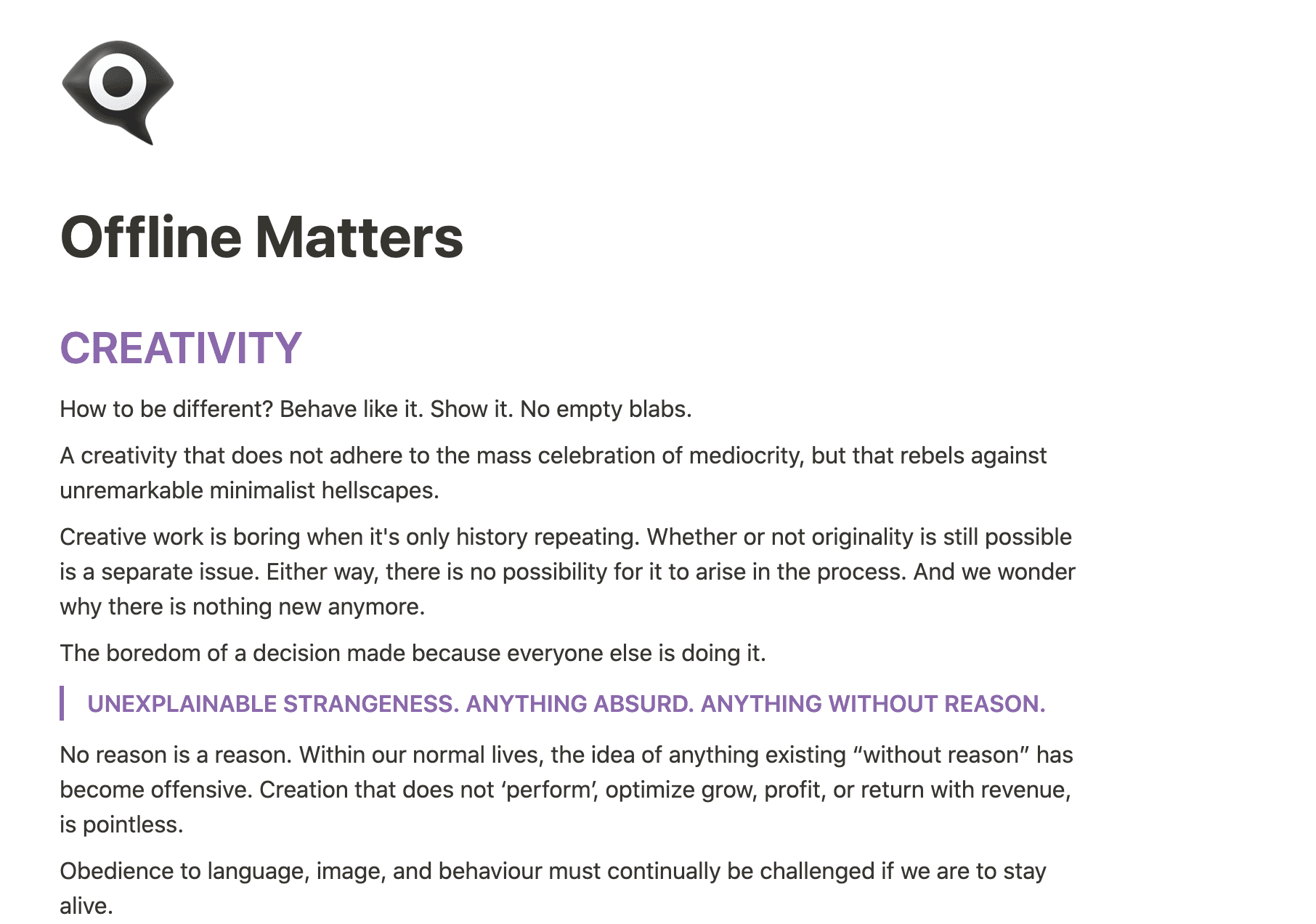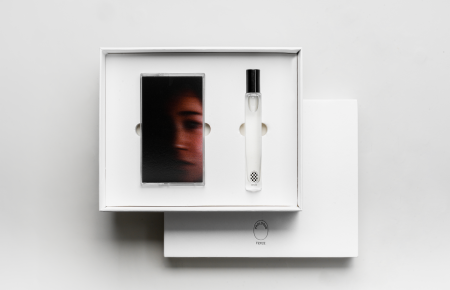Offline Matters: An Interview Series is co-presented with No Fun Mag, a membership newsletter by Jess Henderson, author of the book Offline Matters: The Less-Digital Guide to Creative Work.
In her most recent interview, Jess speaks with Paris-based Argentinian designer Eugenia Digon, who focuses on brand design and visual communication. As luck would have it, their friendship (and this interview) began when Eugenia — or “Ginny,” as Jess affectionately knows her) — reached out to Jess after reading Offline Matters amid “the data-delusions and sense of diminishing possibility within creative work today.”
Dear Ginny,
Welcome to No Fun. It’s so great you reached out. First off, could you tell us about your work, what a day looks like for you, and how your experience of working during the pandemic has been?
Hi, Jess! First of all, thank you so much for having me here. I feel honored and low-key nervous. Currently, I live in Paris. I moved here about a year and a half ago after I left my hometown of Buenos Aires where I lived all my life until coming here.
I live a rather quiet life nowadays, with my days usually occupied by work, going to parks to read, walking around the city with my headphones on, discovering new restaurants, and failing at mastering the French language.
I’m a graphic designer/visual communicator that works mostly on branding and visual design. I work remotely and have been doing for over 4 years now. As working from home was already my ‘normal’, it didn’t really effect me when the pandemic started.
But then when a curfew starting at 6pm was introduced and things got a bit crazy. That period lasted almost 7 months. During that time it felt like I was only living to work. Once the workday was over, surprise!… You couldn’t leave home, go anywhere, do anything or see anybody. The area in my apartment where I work turned into the place where I also slept, ate, did exercise, read… Just now, and not on purpose, I just described the situation as “the place where I work turned into home” rather than the other way around. That shows how much work has become a central element of life during the pandemic. For me it really felt like there was no chance to do anything else.
This obviously impacted the work-related aspects of my mental health. I have been stuck in a loop feeling as though my value as a person equates to my value as a “professional”. Only recently have I started coming out of it. But I’ll be honest, I’ve had a burnout. And I’m still in it.
We met as you reached out having read the book Offline Matters. Can you tell me how you came across it to begin with?
I came across Offline Matters last September. It sounds silly, but I describe the encounter as almost mystical. Prior to that, I had never heard of Outsider or No Fun (which I greatly regret). It was a Saturday afternoon and I had the idea of going to Artazart library to ‘find a book’. Any book. I wasn’t looking for anything in particular, I just remember thinking “I want something that makes me think”.
So, there I was, browsing through graphic design and typography books when I saw that mysterious black cover. I read the blurb and knew instantly that I had found the book I didn’t know I was looking for.
It is somewhat shameful to admit—but hopefully it gives more of a notion of how much this book made an impact on me—before reading Offline Matters, I rarely read. I thought that reading books wasn’t for me.
But seriously: Offline was the first book I ever finished in under a month. It turns out, I do love reading.

Mantra by Eugenia Digon, inspired by the book.
— Eugenia Digon
Was there something going on in your work and/or life at the time that made the contents of the book resonate so deeply?
Absolutely. I was going through a major crisis in my work-life, aggravated by the ongoing state of discomfort that one experiences having emigrated to a foreign country.
I was looking to change jobs after feeling stuck for a while in the company I used to work for. Somehow, I was made to believe that I “needed” to find a job in France, simply because “it made sense”. That if I was living here, I needed to work here as well. And because I believed that it would make some of the French administrative hellscapes easier.
So there I was, spending months shaping my “professional persona” into what I thought French companies were looking for, working through versions of lettres de motivation and building a portfolio—that I have since shut down because I felt it just wasn’t me.
To no one’s surprise, this didn’t end well. I had some awful experiences during that job hunt and lost all confidence in my skills and capabilities. What was worse was that no longer felt like myself.
When everything started hurting a bit too much, I decided to pause the job hunt for a while, and coincidentally, that’s when I came across Offline Matters. Immediately it showed me that I was not alone in my thoughts and vision of the creative industry (and work in general). It at once materialized and gave shape to all the thoughts that were scattered throughout my mind. It was both revealing and comforting.
As I was reading every chapter, I constantly felt like this:

May I ask how you read the book? Was it front to back, turning to a page and reading… did you scribble on the pages and take notes in the margins?
Oh yes. I couldn’t help myself from underlining the parts that resonated the most with me. When I finished the book, I went through it again gathering the underlined parts and typed them into a Notion page, which I divided into different themes.
I wanted to have something to keep at hand, to read through my favorite excerpts, and to keep me inspired—and sane—when motivation is low.

Eugenia’s note taking

A snapshot from Eugenia’s Offline Matters page in Notion.
What ideas, thoughts, pieces of discussions in the book spoke to you the most?
To some degree, all of them.
But if I had to pick, what spoke to me most were the ideas around weirdness and absurdity. Working as a brand and graphic designer, I cannot begin to tell you how much I long for weirdness. Design trends and the template-ization of everything is killing (or has killed) creativity. We’ve all become boring, predictable, and safe. And I don’t really know who to blame, because I can’t blame the zillions of designers who state in their portfolio that their work “exists in the intersection of art and technology”—especially if that’s what will land them the job they need to eat or pay rent.
I’ve done it too. I’ve used the safe pre-made phrases, as well as having become allergic to them. But what option do we really have? I wish we could all be as unapologetic as Collins and encourage designers to be whatever the heck they want to be. But is Collins going to hire all the designers in the world? What’s left for the rest?
It’s extremely hard to rebel when our paycheques depend specifically on not rebelling. And so, we became too afraid to try anything unusual. There’s always the constant pressure to create something new and innovative, yet if that is what one does, then it’s said to be too risky, or too weird, or too different. There’s even peer pressure to follow trends and keep doing the same thing over and over. I can’t help but feel that we’re all to blame.
I truly wish creative outputs were less homogeneous. I recently read an interview with Thomas Mars, frontman of the band Phoenix, where he was talking about their upcoming record. At the end, he expresses that he doesn’t really know how the album’s going to sound yet, but said, ‘I hope it’ll stay weird… I hope next time there’s a committee of deciding-what’s-cool, I can be there to say “Weird and different. That’s what’s cool now”.’ I hope for the same. I hope we all stay weird.
You’ve told me you also have a feeling of dissatisfaction with the state of creative work today. Which aspects are the causes of your dissatisfaction? How do you freak with it?
I’m going to resume my dissatisfactions with a meme, if I may…

The thing that strikes me the most right now is how hard it is to detach from one’s creative output. I put a lot of myself in every piece of work I do—even if it’s just that, work—because I put time into it, and that’s time of my life.
I put great mental effort into treating my job like a job, but I can’t completely detach from it if I dedicate ⅓ of my life to it. This probably surpasses the creative industries alone and speaks more about the world of waged work as a whole, and how fucked up it is, and the place and presence we give to work in our lives.
The busyness pandemic, the Linkedin culture/persona, the infantilization of work by using words like ‘challenge…’ No, Mr. Recruiter, I’m not looking for “new challenges”, I’m looking for a job that pays fairly. Is that too much to ask? Sometimes I play a game called ‘see for how long you can browse Linkedin without feeling sick to your stomach.’ I truly cannot believe how everyone is playing this pretend game. No one talks like that in real life! Who believes this shit?
For some time, a friend and I have been thinking about creating an image board/forum/job board that’s called “Just People Working”. Because, really, that’s what we are in these industries of waged work.
We’re Just. People. Working.
Can’t we cut the bullshit?
This sounds so visceral. When you say ‘nobody is really buying it’ – what is it?
I know it sounds visceral and that’s because, I am mad! I feel like Peter Finch in Network.

And how can anybody not feel slightly mad? There’s a great dissonance between what we’re told working in the creative industries would be like, and what it is like in reality. I could go on forever into all the wrong doings I see in the relationship we have with work and what we (‘we’ is what I call ‘my’ generation) have been told we’re supposed to do and accept. But when I talk about ‘it’, for me it is all the discourse and decorative language people put into their ‘professional personas.’ The busyness, the virtue signalling, the not-calling things by their name, the deification of corporate companies… Everybody sounds like robots and echo chambers of the same empty phrases.
Can we just speak frankly as human beings? Can we talk freely about money and worker benefits? Can we stop with the unrealistic requirements (especially seen in the design industry) and the pressure, to present ourselves all the time as passionate and over enthusiastic people, in order to prove ourselves valuable?
Maybe I am being extremely grim, or maybe I have lost all the passion I used to have… Or maybe that passion was always misplaced. That is something I’m trying to work on now—exploring other ways to put my passion into something that’s not work-related or that doesn’t have money as the final reward. Like, side projects, helping friends with their projects, or designing something just because. Even if this is paradoxical (because we’re always looking to be fairly paid for our work), it feels refreshing to choose to do something without having to think about money, for once. It’s one of the remedies I found so far to the burnouts and disappointments. Still testing it, though!




























